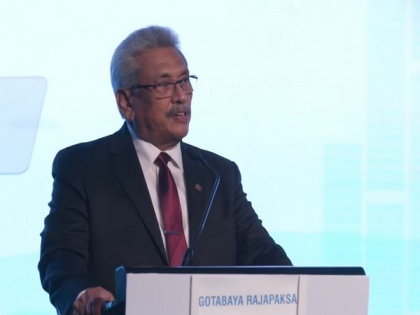Power centralisation under Rajapaksa family underscores S. Lanka's democratic backsliding: Analyst
By ANI | Updated: December 23, 2021 14:40 IST2021-12-23T14:32:52+5:302021-12-23T14:40:12+5:30
Sri Lanka is witnessing a democratic backsliding with the Rajapaksa government's hardline posture offering little hope of addressing minority concerns or pursuing a genuine reconciliation process promised since the end of the civil war, according to an analysis.

Power centralisation under Rajapaksa family underscores S. Lanka's democratic backsliding: Analyst
Sri Lanka is witnessing a democratic backsliding with the Rajapaksa government's hardline posture offering little hope of addressing minority concerns or pursuing a genuine reconciliation process promised since the end of the civil war, according to an analysis.
In an opinion piece in South Asian Voices, Asanga Abeyagoonasekara, an international security and geopolitics analyst and strategic advisor from Sri Lanka, said Colombo was not invited to Biden administration's Summit for Democracy and the failure to receive an invitation reflects the ongoing democratic backsliding under the "semi-autocratic rule" of one family.
"The centralisation of power under the Rajapaksa family in Sri Lanka underscores the democratic backsliding in the country which continued throughout 2021," writes Abeyagoonasekara
"Amidst concerns of extremism and internal instability, the Sri Lankan government's hardline posture offers little hope of addressing minority concerns or pursuing a genuine reconciliation process promised since the end of the civil war, according to an analyst," he adds.
The analyst noted that the majoritarian regime was formed in 2020 with a quick constitutional amendment to remove critical checks on executive power and bring more legislative controls under President Gotabaya Rajapaksa.
Minority communities, including Sri Lanka's Muslim and Tamil populations, have been troubled by multiple events over the past year, points out Abeyagoonasekara says.
"In 2021, the government expanded the powers of the Prevention of Terrorism Act, which has repeatedly been used to justify arbitrary arrests. The arbitrary detentions are likely to trigger extremist sentiments, and Sri Lankan prisons could become breeding grounds for extremism. Three years after the brutal Easter Sunday attack, the government's ultra-nationalist posture with the military at the forefront has triggered more insecurity," he added.
The author also pointed out that China has made considerable inroads into Sri Lanka in 2021 and Projects including the terminal project in Colombo and several large-scale loan packages have made China the most important bilateral player.
"Gotabaya Rajapaksa's foreign policy has so far been similar to the foreign policy of the Mahinda Rajapaksa administration. While the national policy framework of the present government espoused a policy drawing on nonalignment principles, it has in practice taken a "China bandwagon" approach to geopolitics," he said.
( With inputs from ANI )
Disclaimer: This post has been auto-published from an agency feed without any modifications to the text and has not been reviewed by an editor
Open in app